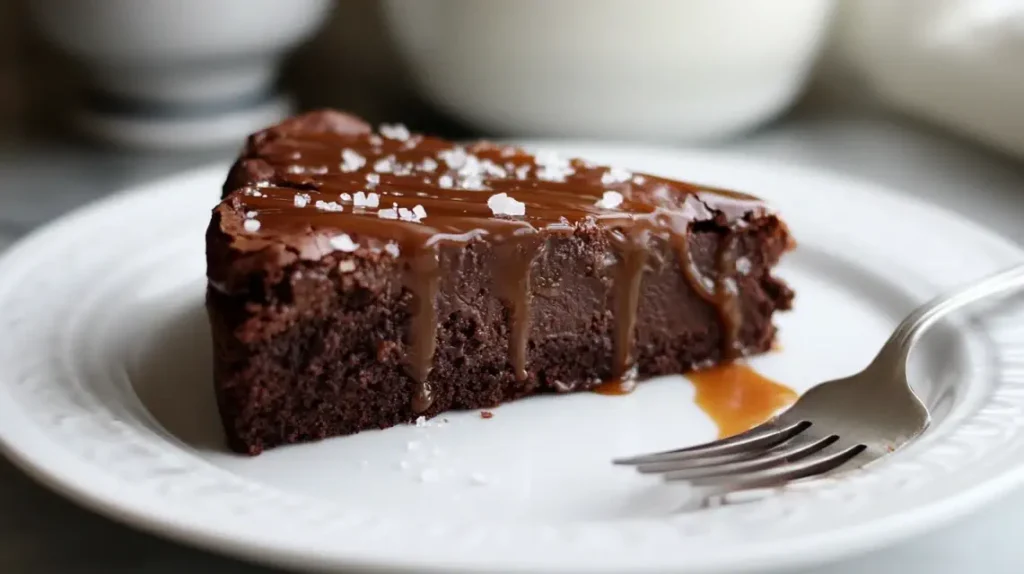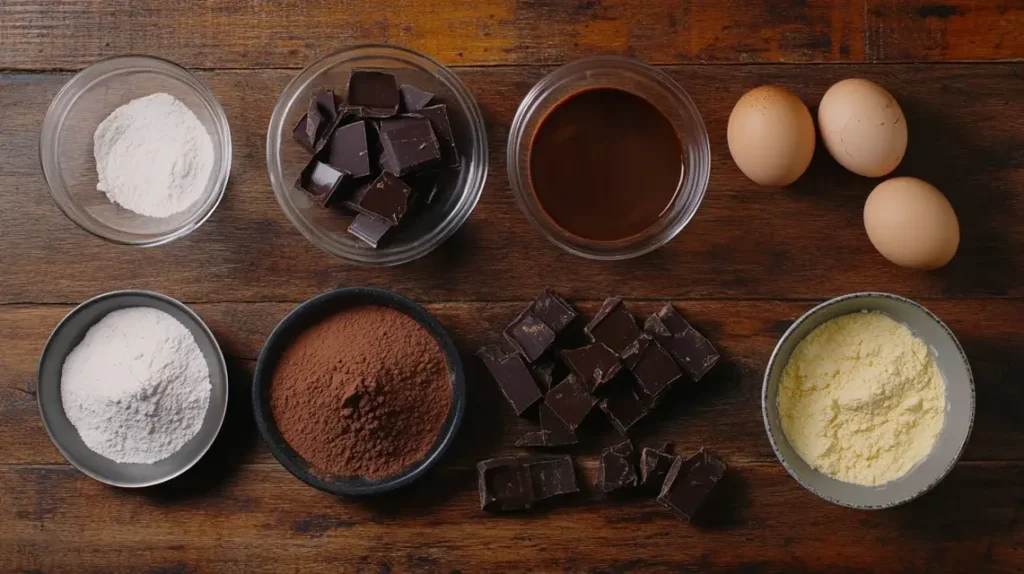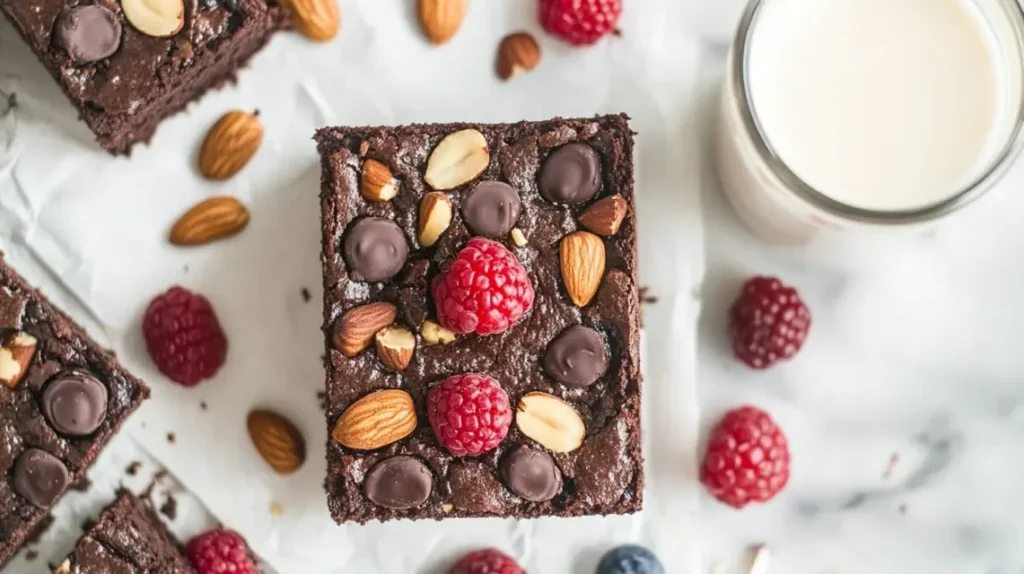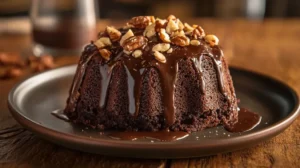Who doesn’t love a good Benefits of Brownie Cake? That fudgy, chocolatey, melt-in-your-mouth goodness is pure happiness in every bite! But did you know that brownie cake isn’t just a guilty pleasure? Yep, this sweet treat actually comes with some surprising benefits.
From boosting your mood to offering some sneaky health perks (yes, chocolate can be good for you!), brownie cake deserves way more love than just being a dessert. So, let’s dive into the wonderful world of brownie cake and discover why you should keep a slice or two on hand.
“A brownie cake a day keeps the sadness away!” – A dessert lover’s philosophy.
Table of Contents
What is Brownie Cake?
Before we jump into the benefits, let’s get one thing straight—what exactly is brownie cake? It’s like a hybrid between a classic brownie and a cake, offering the best of both worlds. Imagine the dense, fudgy texture of a brownie combined with the light and airy feel of a cake. Sounds like a dream, right?
Brief History of Brownie Cake
Believe it or not, brownies have been around since the late 19th century. They originated in the U.S., supposedly as a happy baking accident when a chef forgot to add baking powder to a cake. Instead of a fluffy sponge, they got a rich, gooey delight that became an instant favorite. Over time, bakers experimented, leading to what we now know as brownie cake.
Popularity and Cultural Influence
Brownie cake has made its way into bakeries, coffee shops, and home kitchens worldwide. Whether served warm with ice cream or topped with nuts and caramel, this dessert is a staple in sweet indulgences. It’s the go-to treat for celebrations, stress relief, or simply satisfying a late-night craving.

Nutritional Benefits of Brownie Cake
Okay, let’s be real—brownie cake isn’t exactly a “superfood.” But that doesn’t mean it’s all bad. If made with the right ingredients, it can actually offer some surprising health benefits.
Rich in Antioxidants: The Power of Cocoa
Dark chocolate and cocoa powder, the main ingredients in brownie cake, are packed with antioxidants. These help fight free radicals in your body, reducing the risk of certain diseases and slowing down aging.
“Dark chocolate is loaded with nutrients that can positively affect your health.” – Harvard Health Publishing
Provides Instant Energy
Feeling low on energy? A small piece of brownie cake can give you an instant boost. Thanks to the sugar and carbohydrates, your body gets a quick energy source, perfect for those afternoon slumps.
Mood-Boosting Effects: Chocolate and Happiness
Ever wonder why chocolate makes you happy? It’s because it triggers the release of endorphins—your body’s natural feel-good chemicals. Plus, cocoa contains theobromine, which can enhance mood and reduce stress.
A Source of Healthy Fats (When Made with Quality Ingredients)
Not all fats are bad! If you use coconut oil, almond flour, or avocado in your brownie cake recipe, you’ll be getting healthy fats that are good for your heart and brain.
Unlike traditional cakes, brownie cakes deliver a more intense chocolate experience, thanks to their dense, fudgy texture. If you’re interested in a decadent dessert option, check out this chocolate brownie cake recipe for the ultimate indulgence.
Healthier Brownie Cake Options
Now, if you’re worried about the sugar and butter content, don’t worry—there are plenty of ways to make brownie cake healthier without losing its deliciousness.
Whole Wheat and Gluten-Free Brownie Cakes
Switching out white flour for whole wheat, oat, or almond flour boosts fiber content, making it more filling and easier to digest.
Using Natural Sweeteners
Instead of refined sugar, try using honey, maple syrup, or mashed bananas. These natural alternatives add sweetness while providing extra nutrients.
Low-Calorie and Protein-Rich Variations
Want a guilt-free version? Try Greek yogurt, black beans, or protein powder to cut down on calories and increase the protein content.
Nutrition Facts: Classic vs. Healthy Brownie Cake
| Nutrient | Classic Brownie Cake | Healthy Brownie Cake |
|---|---|---|
| Calories | 350 per slice | 200 per slice |
| Fat | 18g | 10g (healthy fats) |
| Carbohydrates | 45g | 30g (complex carbs) |
| Protein | 3g | 6g |
| Sugar | 30g | 10g (natural sweeteners) |

Common Problems with Brownie Cake and Their Solutions
Let’s be honest, baking the perfect brownie cake can sometimes feel like rocket science. One minute, you’re dreaming of a rich, fudgy delight, and the next, you’re staring at a rock-hard disaster. But don’t worry—I’ve got your back! Here are some common brownie cake problems and their easy fixes.
Problem #1: Brownies Turn Out Too Dry or Hard
Nothing’s worse than biting into a brownie cake that feels like sandpaper. If your brownie cake is dry, chances are you either overbaked it or used too much flour.
Solution:
- Check baking time: Remove brownies from the oven when the edges are set but the center is still slightly soft.
- Use the toothpick trick: If it comes out with a few moist crumbs, you’re good to go.
- Measure flour correctly: Always spoon and level your flour instead of scooping it directly from the bag.
- Add moisture: A tablespoon of milk, yogurt, or even applesauce can make a difference.
Problem #2: Brownie Cake is Too Gooey or Undercooked
Fudgy is good, but there’s a fine line between that and a raw, soupy mess. If your brownie cake is way too gooey, you might have undercooked it or used too much liquid.
Solution:
- Bake a little longer: Check every 2 minutes after the recommended time.
- Let it set: Brownie cakes firm up as they cool, so give it at least 30 minutes before cutting.
- Reduce liquid ingredients: If the batter looks runny, add a tablespoon of flour to balance it out.
Problem #3: The Taste is Too Bitter or Too Sweet
Getting the perfect sweetness balance can be tricky. Sometimes, too much cocoa makes it bitter, while too much sugar makes it overwhelmingly sweet.
Solution:
- Balance cocoa and sugar: A 1:2 ratio of cocoa powder to sugar usually works best.
- Use high-quality cocoa: Low-grade cocoa can have an unpleasant, bitter aftertaste.
- Add a pinch of salt: It enhances flavor and reduces excessive sweetness.
“Baking is both an art and a science—balance is key!”
The Psychological Benefits of Brownie Cake
Ever wonder why a bite of brownie cake feels like a warm hug? It’s not just your taste buds—there’s science behind it!
Brownie Cake is a Natural Stress Reliever
Chocolate, the star ingredient, contains serotonin and dopamine boosters, which are linked to happiness and relaxation. That’s why you feel so much better after a chocolatey treat!
Brownie Cake Encourages Social Bonding
Think about it—when do you usually eat brownie cake? Birthdays, parties, cozy nights with family? Brownie cake brings people together and makes moments more special.
It’s Comfort Food for the Soul
Bad day at work? Breakup? Just need a pick-me-up? A warm slice of brownie cake can work wonders for your mood. It’s like a tiny edible therapist!
Whether you’re hosting a party or need a quick treat, brownie cake is a guaranteed crowd-pleaser. If you’re a fan of rich chocolate treats, you might also enjoy discovering what makes brownies so special and why they remain a beloved dessert worldwide.
The Role of Brownie Cake in a Balanced Diet
Okay, so we know brownie cake is amazing. But how do you enjoy it without going overboard? Here’s the secret—moderation is everything!
How to Eat Brownie Cake Without Guilt
- Portion control: Instead of eating a giant slice, go for a small square and truly savor it.
- Pair it with healthy food: Have it with berries, Greek yogurt, or nuts to balance the nutrients.
- Bake a healthier version: Use coconut sugar, almond flour, or dark chocolate to make it guilt-free.
Best Times to Eat Brownie Cake for Maximum Enjoyment
- Afternoon snack: Perfect for a mid-day energy boost.
- During celebrations: The ultimate party dessert!
- Late-night treat: Because sometimes, cravings just won’t wait.
Fun Ways to Enjoy Brownie Cake
Sure, brownie cake is amazing on its own, but why stop there? Let’s level up this chocolatey delight with some creative serving ideas that will make your taste buds dance!
Pairing Brownie Cake with Beverages
- Coffee & Espresso: The bitterness of coffee balances the sweetness of brownies perfectly.
- Milk Classic for a reason! Dunk your brownie for extra indulgence.
- Red Wine: Dark chocolate and red wine? A sophisticated combo for an adult treat!
- Matcha or Green Tea: The slight bitterness of matcha complements rich chocolate flavors beautifully.
Creative Toppings & Add-Ons
- Ice Cream: Top with vanilla, caramel, or coffee-flavored ice cream for a divine combo.
- Chocolate Drizzle: Because more chocolate is never a bad thing!
- Fresh Fruits: Strawberries, raspberries, or bananas add a refreshing twist.
- Crushed Nuts: Almonds, walnuts, or hazelnuts add a satisfying crunch.
- Honey or Maple Syrup: A natural way to enhance sweetness.
Making Brownie Cake a Party Favorite
- Brownie Cake Tower: Stack brownie layers with whipped cream and fruit.
- Brownie Cake Cupcakes: Individual portions for easy serving.
- Brownie Cake Pops: Bite-sized treats on a stick—fun and mess-free!

Brownie Cake in the Business World
Did you know that brownie cake can be more than just a dessert? It’s also a money-making opportunity! If you love baking, you can turn your passion into a thriving business.
Why Brownie Cake is a Profitable Dessert Business
The baking industry is booming, and brownie cake is a favorite among customers. Here’s why it’s a smart business idea:
- Easy to Make: Requires simple ingredients and basic baking skills.
- High Demand: People crave brownies all year round!
- Great for Customization: You can offer unique flavors, healthy versions, or themed brownie cakes.
Selling Brownie Cakes Online: E-Commerce Success Tips
If you want to sell brownie cakes online, here’s how to stand out:
- Take High-Quality Photos: Presentation matters! Make sure your brownies look irresistible.
- Use Social Media: Instagram, Facebook, and TikTok are great platforms for promoting your business.
- Offer Different Flavors & Sizes: Mini brownies, large cakes, gluten-free options—variety attracts more buyers.
- Use Good Packaging: Beautiful, eco-friendly packaging makes your product feel premium.
Trending Brownie Cake Flavors in 2024
Want to stay ahead of the game? Try selling these trending flavors:
- Chocolate-Orange Brownie Cake – A zesty twist on the classic.
- Spicy Chili Chocolate Brownie Cake – A sweet and spicy surprise!
- Matcha Brownie Cake – A hit among tea lovers.
- Coconut Almond Brownie Cake – A tropical delight.
Pro Tips for Baking the Perfect Brownie Cake
Want to bake a restaurant-quality brownie cake at home? Here are some expert baking secrets!
Choosing the Right Ingredients
- Use high-quality chocolate (at least 70% cocoa) for a rich taste.
- Room temperature eggs give your brownie cake the perfect texture.
- Real butter over margarine for better flavor and moisture.
The Ideal Baking Temperature & Time
- Best Temperature: 325°F (163°C) to 350°F (175°C) for even baking.
- Time: Bake for 20-25 minutes for a fudgy texture or 30-35 minutes for a cakier result.
- Turn the pan halfway through baking for an even bake.
How to Store Brownie Cake for Maximum Freshness
- Room Temperature: Store in an airtight container for up to 4 days.
- Refrigerate: keeps fresh forup to a week (just warm before eating!).
- Freeze for Later: Wrap in plastic wrap and store for up to 3 months.
Final Thoughts on the Benefits of Brownie Cake
So, what have we learned? Brownie cake is more than just a dessert it’s a comfort food, a social treat, and even a potential business! Whether you enjoy it as a midnight snack or sell it to customers worldwide, brownie cake is here to stay.
“A life without brownie cake is a life less sweet!” – Every dessert lover ever.
Now, go grab a slice (or bake your own), and enjoy every bite. You deserve it!

Brownie Cake
Equipment
- Mixing Bowl
- Oven
- Cake Pan
Ingredients
Brownie Cake Base
- 1/2 cup unsalted butter melted
- 1 cup granulated sugar
- 2 eggs
- 1 tsp vanilla extract
- 1/3 cup unsweetened cocoa powder
- 1/2 cup all-purpose flour
- 1/4 tsp salt
Instructions
- Preheat oven to 350°F (175°C). Grease a cake pan.
- In a bowl, combine melted butter and sugar. Beat in eggs and vanilla extract.
- Stir in cocoa powder, flour, and salt until fully combined.
- Pour batter into the prepared pan and bake for 25–30 minutes.
- Let cool before slicing. Serve as is or with ice cream or whipped cream.

